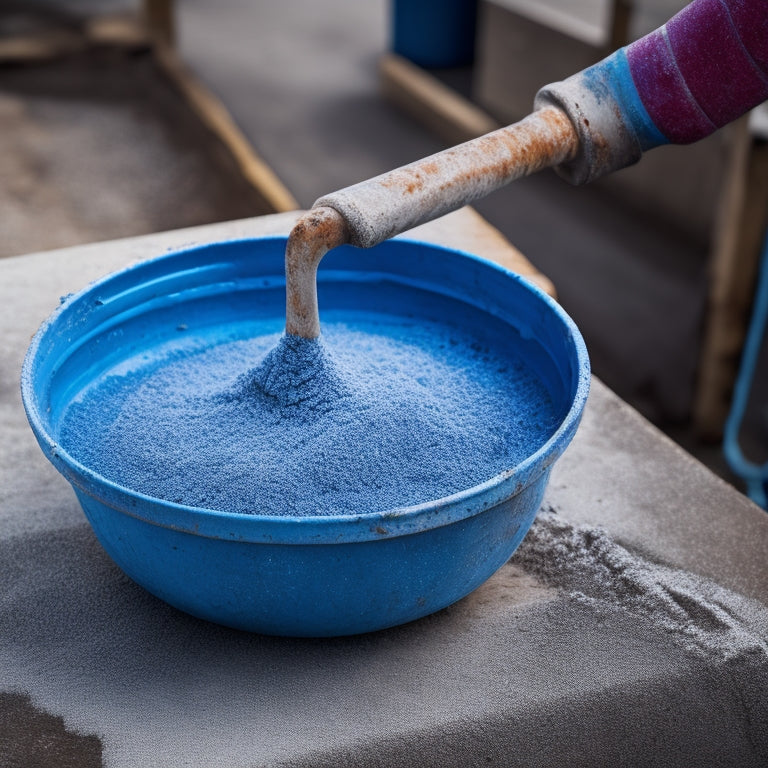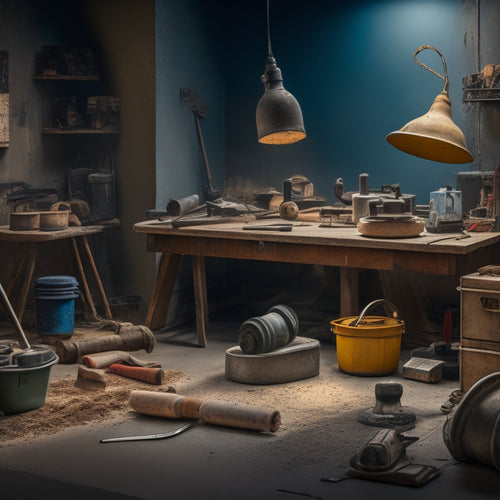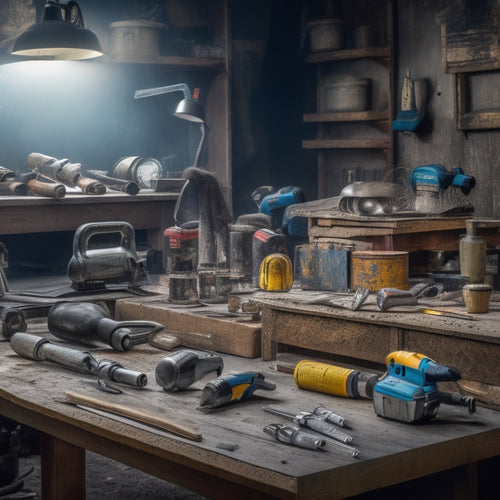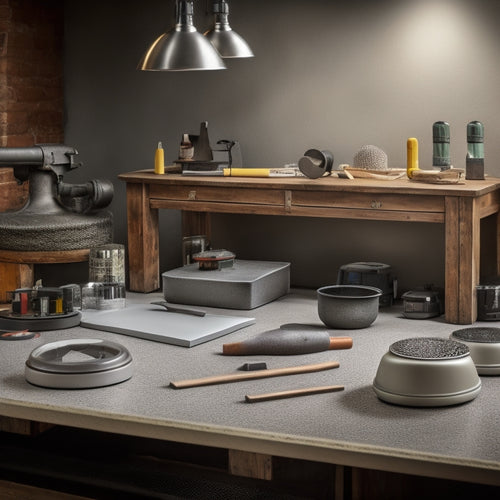
Why Clean Concrete Repair Tools After Each Use
Share
By cleaning your concrete repair tools after each use, you're taking an essential step in maintaining their condition and performance. This habit prevents rust and corrosion damage, extends tool lifespan, and reduces the risk of cross-contamination. Clean tools also guarantee better performance and efficiency, while promoting a safer and healthier working environment. Additionally, regular cleaning makes future maintenance tasks easier, supports proper tool storage, and reflects a commitment to professional workmanship standards. By making cleaning a priority, you'll reap these benefits and more, and discover the full importance of keeping your tools in top shape.
Key Takeaways
• Cleaning concrete repair tools after each use prevents rust and corrosion, maintaining tool condition and extending lifespan.
• Regular cleaning improves tool performance and efficiency, delivering consistent results and reducing the risk of equipment failure.
• Cleaning tools eliminates dirt and prevents bacterial growth, reducing the risk of infections and illnesses and promoting a safer working environment.
• Preventing residue buildup ensures smoother, even finishes for future work and reduces the risk of cross-contamination, compromising repairs and posing health risks.
• Consistent cleaning habits reduce replacement costs, save time, and promote professional workmanship, building trust and reputation for excellence.
Prevents Rust and Corrosion Damage
Cleaning your concrete repair tools regularly prevents rust and corrosion damage, ensuring they remain in good condition and continue to perform at their best.
You've invested in quality tools, and it's crucial to maintain them to extend their lifespan. Rust and corrosion can spread quickly, weakening your tools and affecting the quality of your work.
By cleaning your tools after each use, you're taking a proactive approach to rust prevention and corrosion resistance. Removing dirt, grime, and residue helps to prevent moisture from accumulating, which can lead to rust and corrosion.
Additionally, cleaning your tools allows you to inspect them for any signs of damage or wear, enabling you to address issues before they become major problems.
By making cleaning a habit, you'll save time and money in the long run by reducing the need for frequent replacements or repairs.
Take control of your tools' maintenance, and they'll continue to serve you well.
Reduces Risk of Cross Contamination
By scrubbing away dirt and debris from your concrete repair tools, you're not only removing visible grime but also eliminating the risk of transferring contaminants from one job site to another.
Cross contamination can occur when tools aren't properly cleaned, allowing bacteria, mold, or other substances to spread from one surface to another. This can lead to compromised concrete repairs, costly rework, and even health risks for workers and building occupants.
As a master concrete repair professional, you know that prevention is key. By regularly cleaning your tools, you're reducing the risk of cross contamination.
Identify common cross contamination sources, such as dirty tools, contaminated mixing water, and unclean work surfaces. Implement prevention strategies like sanitizing tools with a bleach solution, using clean mixing water, and covering work surfaces with plastic sheets.
By taking these proactive steps, you'll guarantee a safer, more reliable concrete repair process that meets the highest standards of quality and integrity.
Extends Tool Lifespan and Durability
As you regularly scrub away dirt and grime, you're not only removing visible imperfections but also protecting your tools from premature wear and tear, ultimately extending their lifespan and durability.
By incorporating cleaning into your maintenance practices, you're ensuring tool longevity and saving yourself the hassle of frequent replacements. A clean tool is less prone to rust, corrosion, and damage from built-up debris, allowing it to perform efficiently for a longer period.
When you neglect cleaning, dirt and grime can seep into crevices and cause mechanical failures, reducing your tool's lifespan. Conversely, regular cleaning helps maintain the tool's original condition, preserving its functionality and performance.
Improves Tool Performance and Efficiency
Regularly scrubbed concrete repair tools perform with precision and accuracy, delivering consistent results that meet your high standards. You can't afford to compromise on tool performance, especially when working on critical projects with tight deadlines.
Cleaning your tools after each use guarantees they remain in top condition, allowing you to complete tasks efficiently and effectively. This attention to detail maintains tool efficiency, enabling you to work smarter, not harder.
By incorporating this maintenance practice into your daily routine, you'll notice a significant improvement in the overall quality of your work. Clean tools also reduce the risk of equipment failure, which can lead to costly delays and rework.
Enhances Operator Safety and Health
When you clean your concrete repair tools regularly, you're not just keeping them in good condition - you're also taking care of yourself.
By removing dirt, grime, and other substances, you'll prevent skin irritation issues, reduce the risk of infection, and minimize respiratory problems.
Prevents Skin Irritation Issues
Cleaning your concrete repair tools thoroughly prevents skin irritation issues by removing harsh chemicals and residue that can cause redness, itching, and blistering.
You're not just protecting your tools; you're also taking care of your skin. When you neglect to clean your tools, you're exposing yourself to potential skin care problems that can be painful and uncomfortable.
Here are some reasons why cleaning your tools is essential for skin care and irritation prevention:
-
Harsh chemicals can seep into your skin: Unclean tools can transfer chemicals to your skin, causing irritation and other skin problems.
-
Residue buildup can lead to skin reactions: Failing to clean your tools regularly allows residue to build up, which can cause skin reactions and irritation.
-
Dirty tools can spread skin infections: Unclean tools can spread skin infections and other skin problems, making it imperative to clean them thoroughly after each use.
- Clean tools promote healthy skin: By cleaning your tools regularly, you're promoting healthy skin and preventing skin care issues that can arise from neglecting your tools.
Reduces Risk of Infection
Unclean concrete repair tools can become breeding grounds for bacteria, putting you at risk of infection with every use. This is especially true if you're working with tools that have come into contact with contaminated materials or have been used in unsanitary environments.
When you fail to clean your tools, bacteria can multiply and spread, increasing the risk of infection. This can lead to serious health issues, including skin infections, respiratory problems, and even life-threatening conditions.
To prevent this, it's vital to prioritize infection prevention by sanitizing your tools after each use. This involves thoroughly washing your tools with soap and water, followed by a disinfectant solution to kill any remaining bacteria.
Regular tool sanitation is important in reducing the risk of infection and ensuring a safe working environment. By making cleaning a habit, you'll greatly minimize the risk of infection and protect your health.
Minimizes Respiratory Problems
Your lungs are constantly at risk from concrete dust and debris that can accumulate on your tools, making it vital to clean them regularly to prevent respiratory problems.
Cleaning your concrete repair tools after each use is essential for maintaining your respiratory health. Airborne contaminants from concrete dust can cause serious health issues, including respiratory diseases and even cancer.
By cleaning your tools regularly, you can minimize your exposure to these harmful substances. Here are some benefits of cleaning your tools:
-
Reduces the amount of airborne contaminants released during subsequent uses
-
Prevents the accumulation of dust and debris, which can exacerbate respiratory problems
-
Helps to remove hazardous materials that can compromise your respiratory health
- Guarantees a safer working environment for you and your team
Don't risk your health by neglecting to clean your concrete repair tools.
Make cleaning a habit after each use to protect your respiratory health and maintain a safe working environment.
Maintains Tool Hygiene and Sanitation
When you clean your concrete repair tools, you're not just removing dirt and grime - you're also maintaining tool hygiene and sanitation.
By doing so, you'll prevent bacterial growth, reduce cross contamination, and eliminate residue buildup.
Prevents Bacterial Growth
By regularly cleaning your concrete repair tools, you prevent bacterial growth that can compromise the integrity of your equipment and pose health risks to you and others. This is especially important in concrete repair, where tools come into contact with contaminated surfaces and materials.
Failing to clean your tools can lead to the spread of bacteria, which can cause infections, illnesses, and even fatalities.
To maintain bacterial control and uphold good hygiene practices, make sure to:
-
Clean your tools with soap and water after each use
-
Disinfect high-touch areas with a bleach solution
-
Dry your tools thoroughly to prevent moisture buildup
- Store your tools in a well-ventilated area to reduce humidity
Reduces Cross Contamination
Regular cleaning of your concrete repair tools reduces cross contamination, a critical step in maintaining tool hygiene and sanitation, as dirty tools can easily spread contaminants to clean surfaces and freshly mixed materials. This is especially important when working on projects that require precise color matching or specific finish requirements.
| Contamination Sources | Cleaning Techniques |
|---|---|
| Debris and dirt | Use a wire brush to remove large particles |
| Old concrete residue | Soak tools in a solution of water and mild detergent |
| Bacteria and mold | Sanitize tools with a disinfectant specifically designed for concrete tools |
Eliminates Residue Buildup
Clean your concrete repair tools regularly to prevent residue buildup, which can compromise their performance and lead to a decline in tool hygiene and sanitation over time.
When you don't clean your tools, residue from previous projects can accumulate, making it difficult to achieve a smooth, even finish. This buildup can also harbor bacteria, mold, and mildew, which can spread to new projects and contaminate surfaces.
Regular cleaning eliminates residue buildup, ensuring your tools remain in top condition.
You'll want to target the following residue types:
-
Dried concrete and cement
-
Epoxy and polyurethane adhesives
-
Paint and coating residue
- Oil and grease stains
Eases Future Tool Maintenance Tasks
You'll find that cleaning your concrete repair tools after each use sets you up for success when it's time to perform maintenance tasks down the line. By removing dirt, grime, and residue, you're preventing the buildup of stubborn substances that can make future maintenance a nightmare.
When you clean your tools regularly, you'll reduce the likelihood of corrosion, rust, and other forms of damage that can shorten their lifespan. This means you'll get more mileage out of your tools, and they'll continue to perform at their best for a longer period.
Regular cleaning also makes it easier to identify potential issues before they become major problems. By keeping your tools in pristine condition, you'll be able to spot signs of wear and tear more easily, allowing you to take corrective action before it's too late.
This proactive approach will save you time, money, and frustration in the long run. By cleaning your concrete repair tools after each use, you're investing in their tool longevity and making future maintenance tasks a breeze.
Supports Proper Tool Storage Practices
By keeping your concrete repair tools spotless, you're better equipped to store them in a way that prevents damage and prolongs their lifespan.
Clean tools are less likely to corrode or rust, making them easier to store and maintain. This, in turn, supports proper tool storage practices that help you stay organized and efficient on the job site.
Here are some benefits of clean tools and proper storage:
-
Tool organization: Clean tools can be categorized and stored according to their function, making it easier to find what you need when you need it.
-
Storage solutions: Clean tools can be safely stored in designated containers or bins, keeping them protected from the elements and preventing damage.
-
Reduced clutter: Clean tools take up less space, reducing clutter and making it easier to navigate your workspace.
- Extended tool life: Proper storage and maintenance of clean tools can extend their lifespan, saving you money in the long run.
Promotes Professional Workmanship Standards
Maintaining spotless concrete repair tools sends a strong message about your commitment to professional workmanship standards, as it demonstrates attention to detail and a focus on quality.
You're showcasing your dedication to delivering exceptional results, which is essential for building a strong professional reputation. When you take the time to clean your tools, you're signaling to clients and colleagues that you're committed to craftsmanship excellence.
Clean tools also guarantee that you're working efficiently and effectively. When you're not wasting time dealing with clogged or rusty tools, you can focus on getting the job done right.
This, in turn, helps you meet deadlines and exceed client expectations. By maintaining clean tools, you're demonstrating a level of professionalism that sets you apart from others in the industry.
You're showing that you're serious about your work and willing to go the extra mile to guarantee that every project is completed to the highest standard. By doing so, you'll build trust with your clients and establish a reputation for excellence that will serve you well in the long run.
Frequently Asked Questions
Can I Use the Same Cleaning Solution for All Concrete Repair Tools?
You wonder if you can use the same cleaning solution for all concrete repair tools. Here's the deal: it's not a one-size-fits-all situation.
Different tools require specific cleaning solutions to maintain their effectiveness and extend their lifespan.
For instance, acid-based solutions are perfect for trowels, while mild soap and water work best for finishing tools.
Proper tool maintenance demands using the right cleaning solution for each tool, so take the time to research and invest in the right products.
How Often Should I Lubricate Moving Parts During Tool Cleaning?
As you hold the well-oiled machine that's your concrete repair tool, you're reminded of a finely tuned orchestra - each part working in harmony.
When it comes to lubrication frequency, you'll want to strike the right note. Aim to lubricate moving parts every 1-3 months, or as needed, to prevent rust and corrosion.
Follow these maintenance tips: clean the area, apply a small amount of lubricant, and wipe off excess.
Are There Any Specific Cleaning Methods for Electronic Concrete Tools?
When it comes to electronic concrete tools, you'll want to employ specialized cleaning techniques to guarantee ideal tool maintenance.
Avoid using harsh chemicals or abrasive materials that can damage sensitive components.
Instead, gently wipe down tools with a soft, dry cloth to remove dirt and debris.
For more thorough cleaning, use a mild soap solution and a soft-bristled brush to clean crevices and vents.
Can I Clean Concrete Repair Tools With High-Pressure Washes?
Like a medieval knight polishing his armor, you're wise to wonder if high-pressure washes are the way to go for cleaning your concrete repair tools.
But, beware! While high pressure might be effective at blasting away debris, it can compromise tool durability.
Instead, opt for a gentle yet thorough cleaning with soap and water to keep your tools in top condition.
Your equipment will thank you, and so will your projects.
Are There Any OSHA Regulations Regarding Tool Cleaning and Sanitation?
You're right to wonder about OSHA regulations on tool cleaning and sanitation. The answer is yes, OSHA does have specific guidelines.
According to OSHA's general requirements for personal protective equipment (PPE), you must clean and sanitize tools regularly to prevent the spread of hazardous substances and diseases.
This guarantees tool safety and meets sanitation requirements, protecting you and your team from potential health risks.
Conclusion
You've invested in high-quality concrete repair tools; now it's time to protect that investment.
By cleaning your tools after each use, you'll reap a multitude of benefits.
For instance, consider a contractor who neglected to clean their trowel, only to have it rust and ruin an entire batch of freshly mixed concrete.
Don't let this happen to you - make cleaning a priority to extend the life of your tools, prevent damage, and guarantee a job well done.
Related Posts
-

Top Concrete Resurfacing Tools for a Pro Finish
When it comes to achieving a professional finish in concrete resurfacing projects, you require the right set of speci...
-

Essential Power Tools for DIY Concrete Sculpting
As you begin DIY concrete sculpting, you'll need a strategic selection of power tools to achieve professional-grade r...
-

10 Best Tools for Sealed Concrete Finishing Success
When it comes to sealed concrete finishing success, you need a robust arsenal of specialized tools. Start with essent...


